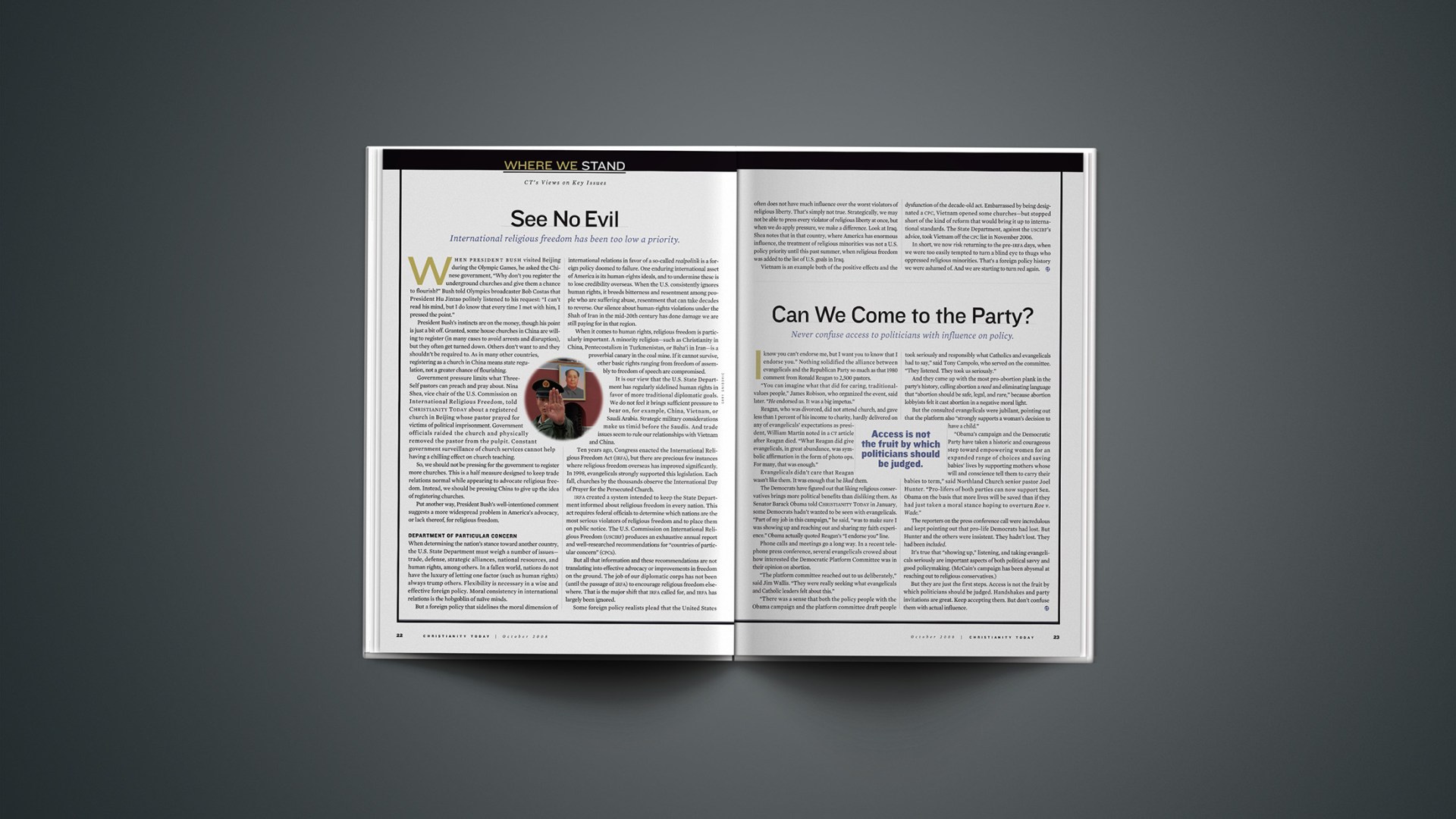“I know you can’t endorse me, but I want you to know that I endorse you.” Nothing solidified the alliance between evangelicals and the Republican Party so much as that 1980 comment from Ronald Reagan to 2,500 pastors.
“You can imagine what that did for caring, traditional-values people,” James Robison, who organized the event, said later. “He endorsed us. It was a big impetus.”
Reagan, who was divorced, did not attend church, and gave less than 1 percent of his income to charity, hardly delivered on any of evangelicals’ expectations as president, William Martin noted in a CT article after Reagan died. “What Reagan did give evangelicals, in great abundance, was symbolic affirmation in the form of photo ops. For many, that was enough.”
Evangelicals didn’t care that Reagan wasn’t like them. It was enough that he liked them.
The Democrats have figured out that liking religious conservatives brings more political benefits than disliking them. As Senator Barack Obama told Christianity Today in January, some Democrats hadn’t wanted to be seen with evangelicals. “Part of my job in this campaign,” he said, “was to make sure I was showing up and reaching out and sharing my faith experience.” Obama actually quoted Reagan’s “I endorse you” line.
Phone calls and meetings go a long way. In a recent telephone press conference, several evangelicals crowed about how interested the Democratic Platform Committee was in their opinion on abortion.
“The platform committee reached out to us deliberately,” said Jim Wallis. “They were really seeking what evangelicals and Catholic leaders felt about this.”
“There was a sense that both the policy people with the Obama campaign and the platform committee draft people took seriously and responsibly what Catholics and evangelicals had to say,” said Tony Campolo, who served on the committee. “They listened. They took us seriously.”
And they came up with the most pro-abortion plank in the party’s history, calling abortion a need and eliminating language that “abortion should be safe, legal, and rare,” because abortion lobbyists felt it cast abortion in a negative moral light.
But the consulted evangelicals were jubilant, pointing out that the platform also “strongly supports a woman’s decision to have a child.”
“Obama’s campaign and the Democratic Party have taken a historic and courageous step toward empowering women for an expanded range of choices and saving babies’ lives by supporting mothers whose will and conscience tell them to carry their babies to term,” said Northland Church senior pastor Joel Hunter. “Pro-lifers of both parties can now support Sen. Obama on the basis that more lives will be saved than if they had just taken a moral stance hoping to overturn Roe v. Wade.”
The reporters on the press conference call were incredulous and kept pointing out that pro-life Democrats had lost. But Hunter and the others were insistent. They hadn’t lost. They had been included.
It’s true that “showing up,” listening, and taking evangelicals seriously are important aspects of both political savvy and good policymaking. (McCain’s campaign has been abysmal at reaching out to religious conservatives.)
But they are just the first steps. Access is not the fruit by which politicians should be judged. Handshakes and party invitations are great. Keep accepting them. But don’t confuse them with actual influence.
Copyright © 2008 Christianity Today. Click for reprint information.
Related Elsewhere:
Previous Christianity Today editorials can be found here.
For more politics coverage, see Christianity Today‘s campaign 2008 section and the politics blog.










